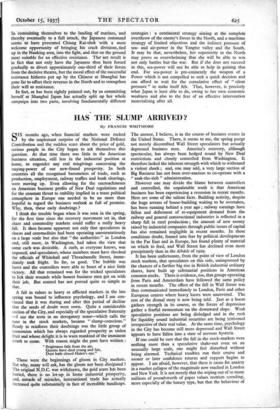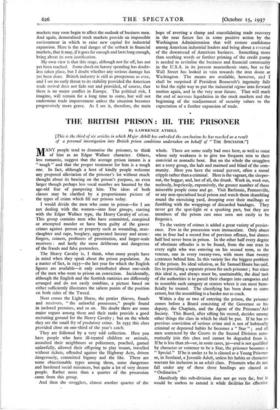HAS THE SLUMP ARRIVED?
By FRANCIS WHITMORE
SIX months ago, when financial markets were rocked by the unpleasant surprise of the National Defence Contribution and the sudden scare about the price of gold, serious people in the City began to ask themselves this question. At that time there was little in the American business situation, still less in the industrial position at home, to engender any real misgivings concerning the staying-power of our new-found prosperity. In both countries all the recognised barometers of trade, such as production, employment, railway traffics and bank clearings, were moving up. Even allowing for the encroachments on American business profits of New Deal regulations and for the constant threat to stability implied in a tense political atmosphere in Europe one needed to be no more than hopeful to regard the business outlook as full of promise. Why, then, these early doubtings ?
I think the trouble began when it was seen in the spring, for the first time since the recovery movement set in, that share and commodity markets could suffer a really heavy fall. It then became apparent not only that speculators in shares and commodities had been operating unostentatiously on a large scale but also that "the authorities" in London and, still more, in Washington, had taken the view that some curb was desirable. A curb, as everyone knows, was imposed, and speculators, whose numbers must have shocked the officials of Whitehall and Threadneedle Street, imme- diately took fright. So far, so good. The bubble was burst and the controllers were able to boast of a nice little victory. All that remained was for the wicked speculators to lick their wounds while honest business men got on with their job. But control has not proved quite so simple as that.
A fall in values as heavy as afflicted markets in the late spring was bound to influence psychology, and I am con- vinced that it was during and after this period of decline that the seeds of doubt were sown. Quite a considerable section of the City, and especially of the speculative fraternity —I use the term in no derogatory sense—which calls the tune in the stock markets, became "slump-conscious." Ready to reinforce their doubtings was the little group of economists which has always regarded prosperity as stolen fruit and whose delight it is to warn mankind of the imminent wrath to come. With reason might the poet have written :
"Brightness falls from the air, Queens have died young and fair, Dust hath closed Helen's eye."
Those were the beginnings of gloom in City markets. But why, many will ask, has the gloom not been dissipated ? The original N.D.C. was withdrawn, the gold scare has been buried, there is no let-up, in home industrial prosperity, and, miracle of miracles, international trade has actually increased quite substantially in face of incredible handicaps. The answer, I believe, is in the course of business events in the United States. There, it seems to me, the spring purge not merely discomfited Wall Street speculators but actually depressed business men. America's recovery, although spectacular, has always been hedged round by New Deal restrictions and closely controlled from Washington. It therefore lacked the inherent strength with which to withstand a violent shock ; and, one may add, a very large section of Big Business has not been over-anxious to co-operate with a f` soak-the-rich " administration.
However one may divide the blame between controllers and controlled, the unpalatable truth is that American business has been experiencing a recession in recent months. Here are some of the salient facts. Building activity, despite the huge arrears of house-building waiting to be overtaken, has been running behind a year ago ; railway earnings have fallen and deferment of re-equipment demand from the railway and general constructional industries is reflected in a sharp fall in steel production ; the amount of new money raised by industrial companies through public issues of capital has also remained negligible in recent months. In these conditions doubt, fanned into fear by political developments in the Far East and in Europe, has found plenty of material on which to feed, and Wall Street has declined even more precipitately than in the &beide of 1929.
It has been unfortunate, from the point of view of London stock markets, that speculators on this side, unimpressed by the chances of a further big rise in British industrial ordinary shares, have built up substantial positions in American common stocks. There is evidence, too, that groups operating from Paris and Amsterdam have followed the same policy in recent months. The effect of the fall in Wall Street was thus communicated immediately to London, Paris and other European centres where heavy losses were uncovered. The rest of the dismal story is now being told. Just as a boom gathers strength in its course, so the forces of depression gather a fearful momentum on the downward slope. Weak speculative positions are being dislodged and in the rush for liquidity sound industrial securities are being jettisoned irrespective of their real value. At the same time, psychology in the City has become still more depressed and Wall Street appears to have fallen into a state of nervous hysteria.
If one could be sure that the fall in the stock-markets were nothing more than a speculative shake-out even on an ususually large scale, one might feel disturbed without being alarmed. Technical troubles run their course and sooner or later confidence returns and support begins to appear. I am afraid, however, that there is cause for anxiety in a market collapse of the magnitude now reached in London and New York. It is not merely that the wiping out of so many millions of poundsworth of paper values restricts spending, more especially of the luxury type, but that the behaviour of markets may soon begin to affect the outlook of business men. And again, demoralised stock markets provide an impossible environment in which to raise new capital for industrial expansion. Here is the real danger of the setback in financial markets, that it may, if it goes far enough and lasts long enough, bring about its own justification.
My own view is that this stage, although not far off, has not yet been reached. Some check on luxury spending has doubt- less taken place, but I doubt whether any serious damage has yet been done. British industry is still as prosperous as ever, and I see no early threat to its stability provided the American trade revival does not fade out and provided, of course, that there is no major conflict in Europe. The political risk, I imagine, will remain for a long time to come, but will not undermine trade improvement unless the situation becomes progressively more grave. As I see it, therefore, the main hope of averting a slump and consolidating trade recovery in the near future lies in some positive action by the Washington Administration that will restore confidence among American industrial leaders and bring about a reversal of the downtrend of American business. Something more than soothing words or further priming of the credit pump is needed to revitalise the business and financial community in the U.S.A. in its -present neurasthenic state, but so far Wall Street has looked in vain towards the iron dome at Washington. The means are available, however, alai I shall be surprised if President Roosevelt's ingenuity fails to find the right way to put the industrial regime into forward motion again, and in the very near future. That will mark the end of nervous liquidation in the stock markets and the beginning of the readjustment of security values to the expectation of a further expansion of trade.























































 Previous page
Previous page